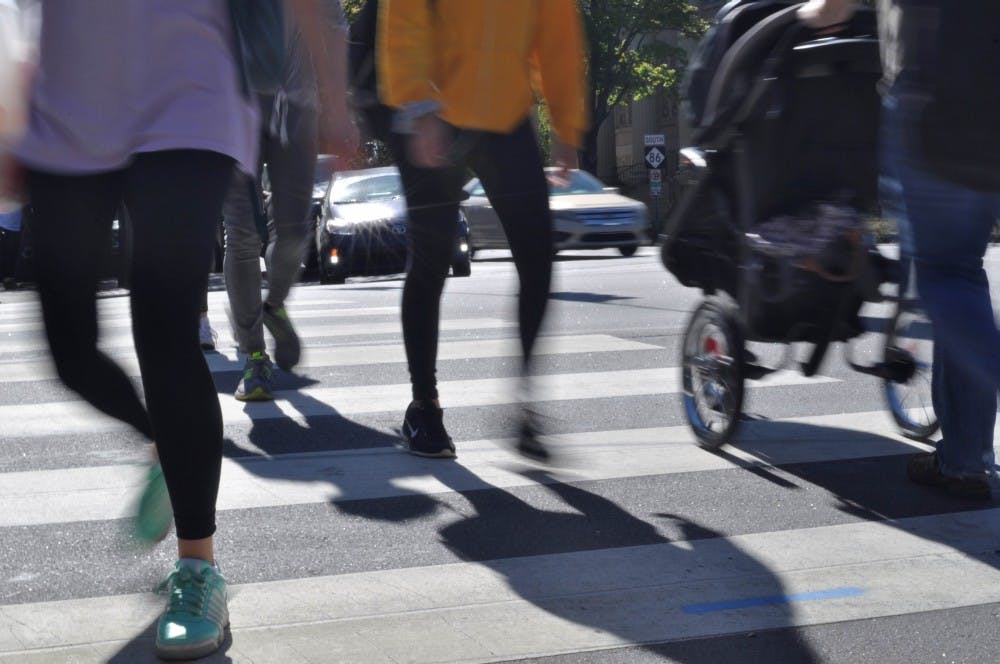Even buildings that are technically accessible, Tyner said, are still not always ideal.
“A lot of them are like that, where you could get in there if you really wanted to, but there's no dignified way to do it,” Tyner said. “That's a whole thing about being disabled — having access and maintaining your dignity while doing stuff.”
Ascension Tattoo recently moved from a location on Franklin Street to a new location on North Columbia Street. While the old location had a flight of stairs that prevented some from entering, the new location has accessible parking and a wheelchair ramp.
“That’s one of the reasons this location was so very attractive to us,” apprentice Jessica Ashley said. “I liked our old place, but it was really difficult when someone would call and we’d have to be like, ‘if you have any mobility impairments, you’re probably not going to be able to make it up here.’”
Ashley said installing an elevator or lift at the old location would have been cost-prohibitive, and other businesses on Franklin Street face a similar problem.
Tyner said education is important to improve access, and she believes people in Chapel Hill are willing to learn. However, she said, treating people with mental or developmental disorders as children or viewing them as a burden gets in the way of that, especially for those who also belong to other marginalized groups.
“It’s hard to get people to care, especially people that aren’t disabled or know disabled people, to get involved in accessibility,” Tyner said. “If you’re not disabled, it can feel superfluous. If it doesn’t affect you, it’s hard to care about it.“
What the town is doing
Meanwhile, ADA policy holds municipalities to a different standard than businesses. Beyond the "reasonable accommodation" standard, the Town is required to make structures accessible and accommodate mobility needs in public transit.
The Town provides a variety of accommodations to increase access for people, including benches at bus stops, kneeling buses with low floors and training for drivers to assist riders, Chapel Hill Transit Director Brian Litchfield said. However, Chapel Hill still has corridors that present challenges for people with disabilities.
“There's so many bus stops where there's no benches for stretches and blocks at all,” Simpson said. “It's a real problem.”
The length of the sidewalk along West Cameron Avenue between South Merritt Mill Road and South Columbia Street that passes Granville Towers is an area of particular concern. Along this pathway, there is no accessible route for over half a mile.
To get the day's news and headlines in your inbox each morning, sign up for our email newsletters.
Several other extended stretches of pathways downtown have crosswalk buttons facing the wrong direction, sidewalk gaps, missing ramps and obstructed pathways, among other concerns.
Litchfield said the town is working to address some of these problems.
“Accessibility and mobility are key priorities for Chapel Hill Transit and our funding partners,” Litchfield said in an email.
Litchfield said the department is finalizing a contract to update 20 bus stops around town to be ADA compliant, installing benches and ramps at stops that need them. Litchfield said the Town will continue to identify stops that lack accessibility for future updates.
Chapel Hill Transit also operates a service called EZ Rider that picks up passengers with disabilities in a lift-equipped vehicle and takes them directly to their destinations. Litchfield said these vehicles are in the process of being replaced and updated, and the ADA Transition Plan sets target completion dates for sidewalk and curb updates over the next few years.
Chapel Hill Communications Manager Catherine Lazorko said the ADA Transition Plan, part of a larger Mobility and Connectivity Plan, provides a framework to help the Town identify needs and make improvements.
“These plans contain considerable public input and big ideas for our future and, in most cases, require long-range funding to realize their full vision,” Lazorko said in an email. “The plans illustrate the Town’s commitment to improvements. Implementation is a long-term process.”
@alicebbennett
city@dailytarheel.com



